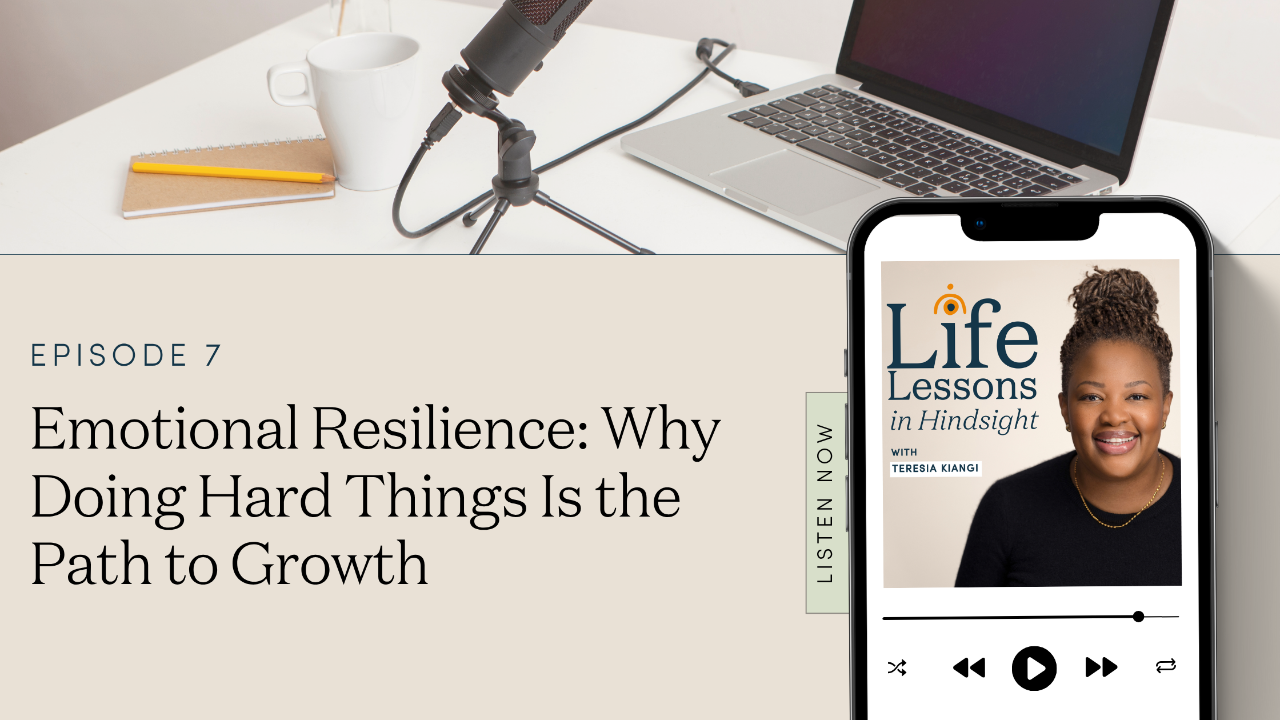Emotional Resilience: Why Doing Hard Things Is the Path to Growth
Jun 26, 2025
Listen In
Have you ever looked back and realized how far you’ve come simply because you started? There was a time when I couldn’t even imagine recording one podcast episode—and now I’ve published six. That might not sound like a huge milestone, but today, I’m celebrating the fact that I started. And if you’re on the fence about starting something, I hope this encourages you: just do it.
Getting started—messy, unsure, scared—is how we grow. And that growth? It builds something powerful: emotional resilience.
What Resilience Really Means
In a recent coaching session, a client suggested that resilience could be taught through parenting. That if you just did the right things, your child would become resilient.
But I disagree.
True emotional resilience is not something you can learn in theory. It’s not a mindset you simply adopt—it’s a skill you practice. A muscle you strengthen. And like any muscle, it grows when it’s tested.
Resilience is the ability to bounce back after being emotionally stressed. It’s not about avoiding hardship. It’s about learning how to move through it and return stronger than before.
Resilience Comes From Exposure, Not Perfection
Think of it like training for a sport. You can't just practice scoring goals under perfect conditions and expect to win on game day. Real resilience is built when you navigate bad weather, tough opponents, and pressure. When life gets messy, your ability to keep going—to adjust and try again—that’s what builds your emotional agility.
It’s in the doing, the trying, the messing up, and the starting again that we become resilient.
What’s Your Resilience Style?
Take a moment to reflect:
- How do you respond when life gets hard?
- Do you shut down emotionally?
- Do you give up quickly, or are you someone who regroups and tries again?
- Does your ability to bounce back depend on the support around you, or what else you’re carrying emotionally?
The truth is, resilience has a signature, and yours is unique to you.
Understanding how you respond to stress—not just emotionally, but physically—can help you notice where your limits are. And with that awareness, you can stretch those limits if you want to.
Why Women Often Underestimate Their Strength
I work with so many women who say things like, “I could never do that,” or “That’s just too hard for me.” But what I see isn’t a lack of ability—it’s a lack of practiced resilience.
We don’t give ourselves enough chances to build that emotional muscle. So when discomfort shows up, we see it as a stop sign instead of a signal that growth is happening.
Learning requires discomfort. Resilience is what helps you stay with the discomfort long enough to get to the other side—where the learning and the transformation live.
The Cost of Giving Up
And here’s the tricky thing: giving up doesn’t feel good either. Even when we try to convince ourselves it does.
We create stories to soften the blow—“It wasn’t that important,” or “They were just better than me,” or “This doesn’t work with my anxiety.”
But then we see someone else doing the thing we walked away from, and that old longing bubbles up. It can inspire us—or make us double down on our reasons not to try again.
Ultimately, the choice is always yours. But I believe this with my whole heart: the ability to tolerate hard things is the key to your growth. Avoiding discomfort doesn’t keep you safe—it keeps you small.
Resilience Is Worth the Work
Sticking with something hard—especially when it matters to you—is difficult. But it’s also so worth it.
Your potential is on the other side of that hard thing. And you’re more capable than you think.
Episode Resources
Ready for more focused support?
Schedule your free 1:1 consult call with me today. During this complementary consultation, you’ll see how coaching can give you clarity, confidence and help you take bold action towards your goals.
Let's Connect!
Join our mailing list to receive a free coaching email each week.
Don't worry, your information will not be shared.

